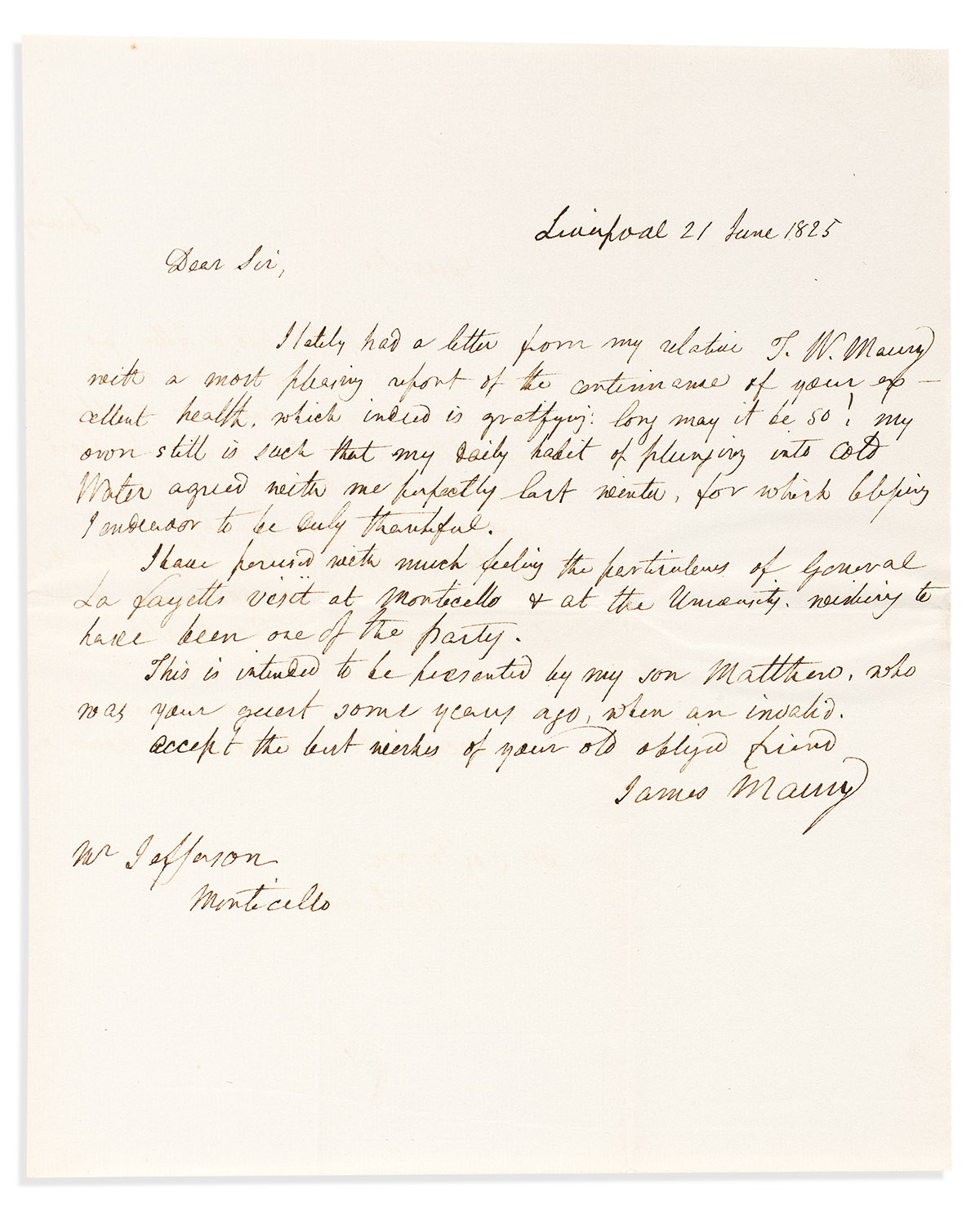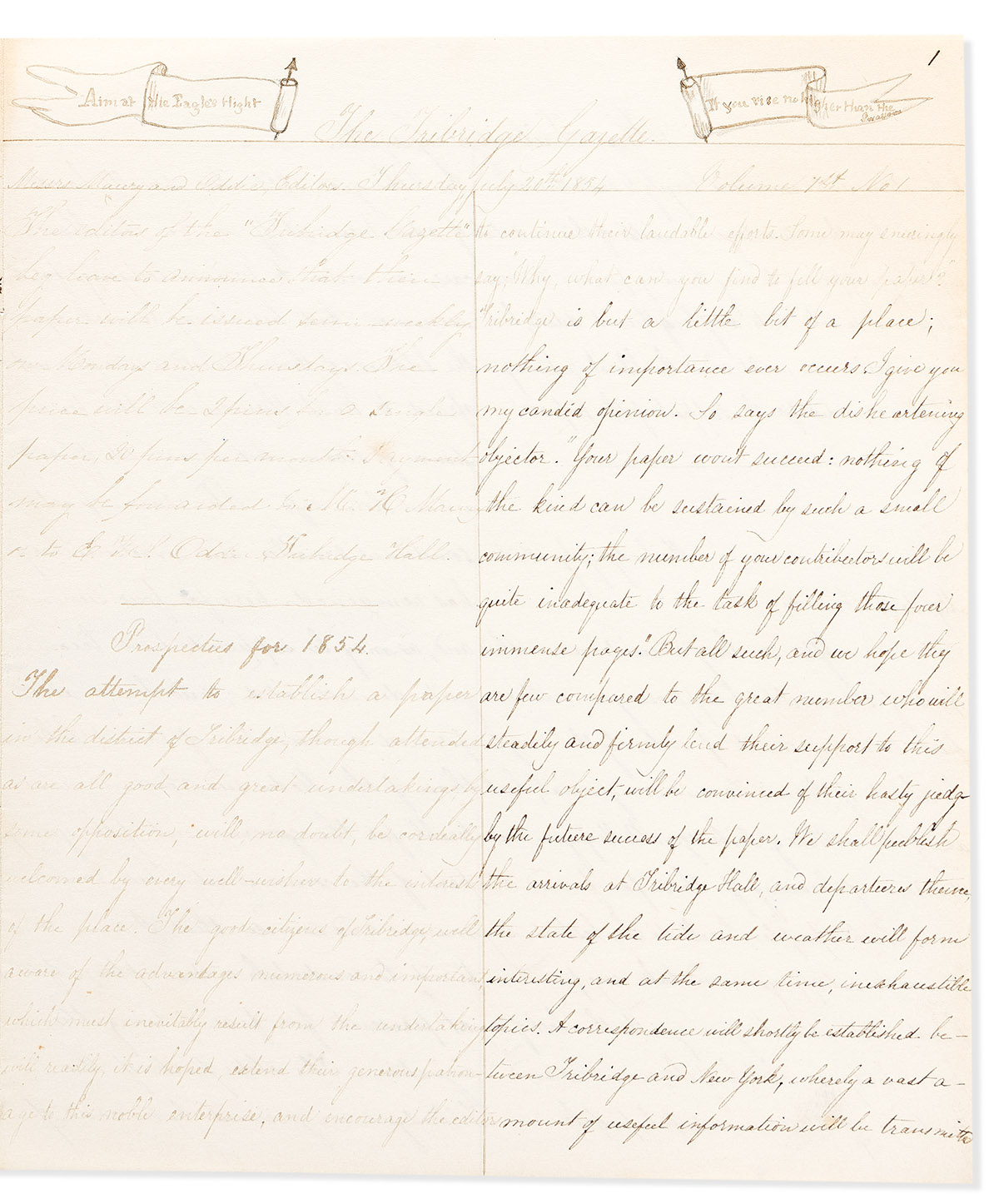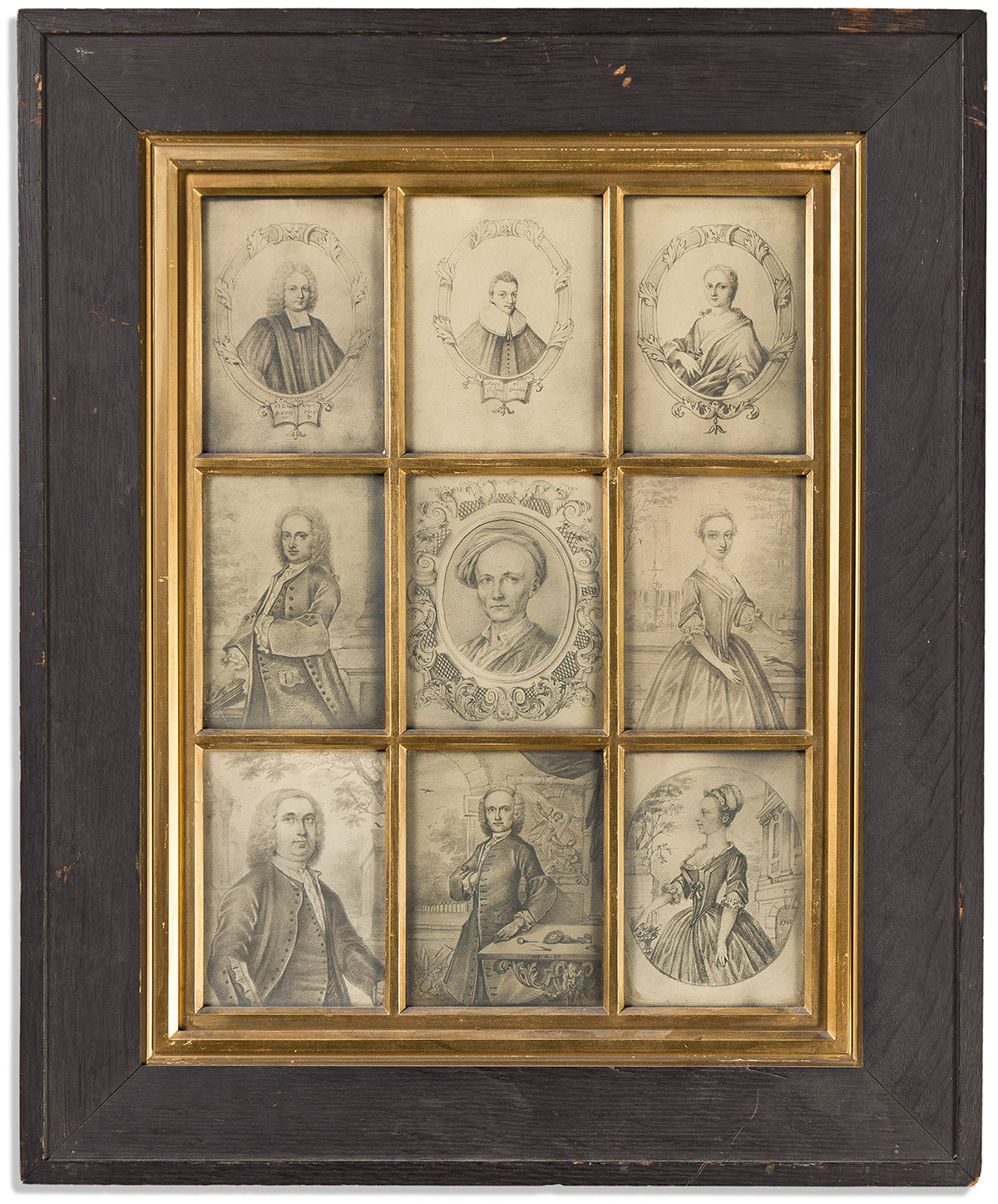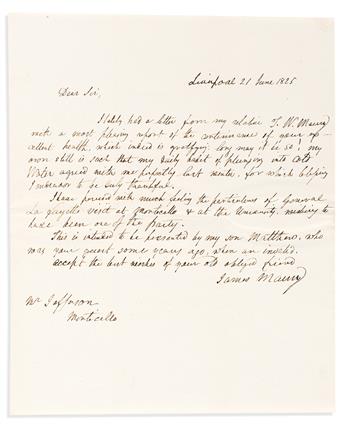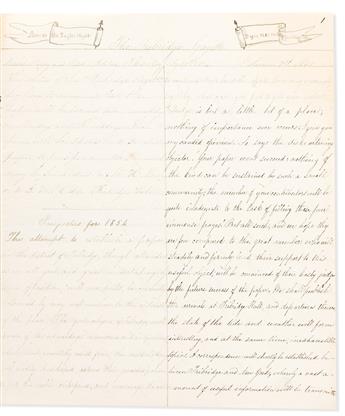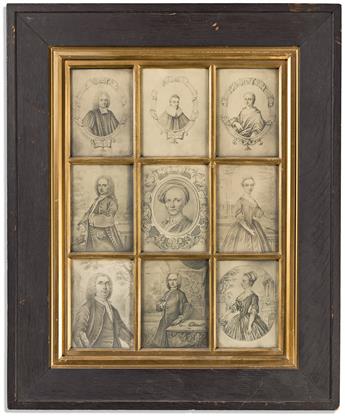Sale 2687 - Lot 128
Price Realized: $ 4,600
Price Realized: $ 5,750
?Final Price Realized includes Buyer’s Premium added to Hammer Price
Estimate: $ 4,000 - $ 6,000
(FAMILY PAPERS.) Correspondence of Consul James Maury with related family papers. Approximately 300 items (1 linear ft.) including one large framed piece; condition varies but generally strong. Various places, 1790-1914
Additional Details
James Maury (1746-1840) came from a distinguished Virginia family; his father had been Thomas Jefferson's teacher. Maury was a merchant until 1790, when he was named United States Consul to Liverpool, an important trading destination. He served there for almost 40 years, retiring to Virginia in 1829.
Also represented here are the consul's son Matthew H. Maury (1800-1877), who remained active in the Liverpool trade before retiring to New York; and daughter Ann Maury (1803-1876), the family historian who divided her time between New York and Fredericksburg, VA. Matthew's children Mary Henrietta Maury (1843-1904) and James Fontaine Maury (1845-1928) are also represented; they shared a summer home in Quogue in eastern Long Island. Among the most notable letters in the collection:
James Madison (1749-1812), president of William & Mary College (and cousin of the U.S. President), writes to James Maury, reporting on the progress of the nation's "wise & patriotic administration," and admitting that the years "strongly admonish me that I ought to look out for some quiet retreat." Williamsburg, VA, 30 April 1805.
Retained draft of a letter from James Maury to former president Thomas Jefferson: "I have perused with much feeling the particulars of General Lafayette's visit at Monticello & at the University, wishing to be one of the party. This is intended to be presented by my son Matthew, who was your guest some years ago, when an invalid." Liverpool, 21 June 1825.
George Stiles (the future mayor of Baltimore) writes to Mary Grymes Maury regarding the death of her son James Walker Maury (1779-1793) of fever in Jamaica, 25 January 1793.
The collection also includes dozens of letters to Consul James Maury from at least five of his Virginia siblings and other family members, 1790-1815, keeping him informed of family and national developments while he spent decades abroad. Sister Matilda H. Maury sent a 2 September 1803 letter describing a vacation "over the ridge last summer" to Staunton, VA and "the Natural Bridge, which I think the most sublime object I ever beheld in nature."
In the next generation are a smaller number of letters to son Matthew H. Maury. His brother James wrote on 27 February 1830 from New Orleans to discuss famed statesman Henry Clay: "I found Mr. Clay here upon a visit to his two daughters Mrs. Duralde & Mrs. Erving [Erwin]. He has received much attention from the leading men of the place, but declined a public dinner. . . . A ball and supper was therefore got up. . . . 800 or 1000 persons present." Included are 15 letters of introduction for Matthew H. Maury, 1825-1829; recipients include Secretary of Treasury Richard Rush; Governor Troup of Georgia; and a variety of merchants and diplomats.
In addition to the correspondence, other manuscripts include an 8-page manuscript "Sketch of the Life of Matthew Maury of New York, 1800-1877" written by one of his children, and "Incidents of the Siege of Yorktown," a 2-page manuscript which recounts stories told by Consul James Maury, who was present at Yorktown in 1781, as relayed to his son Matthew and then recorded by one of Matthew's children circa 1880s. It describes the Comte de Grasse greeting General Washington: "the Comte rushed up & throwing both arms around him he kissed Washington on both cheeks. Washington's face showed that he little relished such a salutation but of course he submitted to this evidence of friendship with his usual dignity." It also describes the famously passive-aggressive surrender ceremony, in which Cornwallis delegated the surrender to a subordinate, who attempted to offer his sword to Rochambeau, "but the latter refused & shrugging his shoulders, pointed toward Washington & said in broken English 'I do not command dis army.' . . . My grandfather sat on horseback just behind Gen. Lincoln so he saw the whole affair very clearly."
A manuscript magazine called the "The Tribridge Gazette" is also included, which was assembled as a summer project for the amusement of friends and family by Mary Henrietta Maury (1843-1904) and her friend Elizabeth Van Schaick Oddie (1840-1916). 12 issues of the magazine are included, dated from 20 July to 1 September 1854, each 4 or 6 pages on loose folding sheets, paginated continuously through page 52. They are accompanied by 6 letters to the editors or "Miss Editress." The location is given only as "Tribridge Hall," but other clues suggest they were located in the Green's Farms neighborhood of Westport, CT.
The family was very proud of their French Huguenot ancestry, through the Maurys and also through Consul James Maury's mother Anne Fontaine. The consul's daughter Ann Maury (1803-1876) documented this heritage in her 1853 book "Memoirs of a Huguenot Family" (copy included). For that work she secured pencil copies of nine ancient Fontaine family portraits held in Europe, two of them serving as basis for lithographs in the book. She had photostatic copies of these nine pencil portraits arranged into a nine-panel frame.
A more detailed inventory of this significant family archive is available upon request. See also the next lot, the related Gilpin family papers.
Also represented here are the consul's son Matthew H. Maury (1800-1877), who remained active in the Liverpool trade before retiring to New York; and daughter Ann Maury (1803-1876), the family historian who divided her time between New York and Fredericksburg, VA. Matthew's children Mary Henrietta Maury (1843-1904) and James Fontaine Maury (1845-1928) are also represented; they shared a summer home in Quogue in eastern Long Island. Among the most notable letters in the collection:
James Madison (1749-1812), president of William & Mary College (and cousin of the U.S. President), writes to James Maury, reporting on the progress of the nation's "wise & patriotic administration," and admitting that the years "strongly admonish me that I ought to look out for some quiet retreat." Williamsburg, VA, 30 April 1805.
Retained draft of a letter from James Maury to former president Thomas Jefferson: "I have perused with much feeling the particulars of General Lafayette's visit at Monticello & at the University, wishing to be one of the party. This is intended to be presented by my son Matthew, who was your guest some years ago, when an invalid." Liverpool, 21 June 1825.
George Stiles (the future mayor of Baltimore) writes to Mary Grymes Maury regarding the death of her son James Walker Maury (1779-1793) of fever in Jamaica, 25 January 1793.
The collection also includes dozens of letters to Consul James Maury from at least five of his Virginia siblings and other family members, 1790-1815, keeping him informed of family and national developments while he spent decades abroad. Sister Matilda H. Maury sent a 2 September 1803 letter describing a vacation "over the ridge last summer" to Staunton, VA and "the Natural Bridge, which I think the most sublime object I ever beheld in nature."
In the next generation are a smaller number of letters to son Matthew H. Maury. His brother James wrote on 27 February 1830 from New Orleans to discuss famed statesman Henry Clay: "I found Mr. Clay here upon a visit to his two daughters Mrs. Duralde & Mrs. Erving [Erwin]. He has received much attention from the leading men of the place, but declined a public dinner. . . . A ball and supper was therefore got up. . . . 800 or 1000 persons present." Included are 15 letters of introduction for Matthew H. Maury, 1825-1829; recipients include Secretary of Treasury Richard Rush; Governor Troup of Georgia; and a variety of merchants and diplomats.
In addition to the correspondence, other manuscripts include an 8-page manuscript "Sketch of the Life of Matthew Maury of New York, 1800-1877" written by one of his children, and "Incidents of the Siege of Yorktown," a 2-page manuscript which recounts stories told by Consul James Maury, who was present at Yorktown in 1781, as relayed to his son Matthew and then recorded by one of Matthew's children circa 1880s. It describes the Comte de Grasse greeting General Washington: "the Comte rushed up & throwing both arms around him he kissed Washington on both cheeks. Washington's face showed that he little relished such a salutation but of course he submitted to this evidence of friendship with his usual dignity." It also describes the famously passive-aggressive surrender ceremony, in which Cornwallis delegated the surrender to a subordinate, who attempted to offer his sword to Rochambeau, "but the latter refused & shrugging his shoulders, pointed toward Washington & said in broken English 'I do not command dis army.' . . . My grandfather sat on horseback just behind Gen. Lincoln so he saw the whole affair very clearly."
A manuscript magazine called the "The Tribridge Gazette" is also included, which was assembled as a summer project for the amusement of friends and family by Mary Henrietta Maury (1843-1904) and her friend Elizabeth Van Schaick Oddie (1840-1916). 12 issues of the magazine are included, dated from 20 July to 1 September 1854, each 4 or 6 pages on loose folding sheets, paginated continuously through page 52. They are accompanied by 6 letters to the editors or "Miss Editress." The location is given only as "Tribridge Hall," but other clues suggest they were located in the Green's Farms neighborhood of Westport, CT.
The family was very proud of their French Huguenot ancestry, through the Maurys and also through Consul James Maury's mother Anne Fontaine. The consul's daughter Ann Maury (1803-1876) documented this heritage in her 1853 book "Memoirs of a Huguenot Family" (copy included). For that work she secured pencil copies of nine ancient Fontaine family portraits held in Europe, two of them serving as basis for lithographs in the book. She had photostatic copies of these nine pencil portraits arranged into a nine-panel frame.
A more detailed inventory of this significant family archive is available upon request. See also the next lot, the related Gilpin family papers.
Exhibition Hours
Exhibition Hours
Aliquam vulputate ornare congue. Vestibulum maximus, libero in placerat faucibus, risus nisl molestie massa, ut maximus metus lectus vel lorem.



